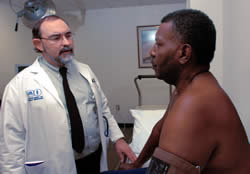Call today, be seen today
GREENVILLE, N.C. (Dec. 15, 2004) — On a weekday morning in mid-November, Jennifer Rosenberg woke up to find she was sick. As in, “”I can’t lift my head off the pillow” sick,” she said.
Rosenberg, an office manager at the Brody School of Medicine at East Carolina University, rarely gets sick. So, after nearly a week of self-medicating with ibuprofen, apple juice and bed rest, she couldn’t take it anymore. By Friday she felt even worse, so she called the ECU Premium Care Clinic at 8 a.m. and was seen at 9:20 a.m. at the Medical Pavilion office. Her diagnosis: the flu.

Dr. Mark Darrow speaks with patient James Henry of Snow Hill at the Eastern Carolina Family Medicine Center. Now at ECU Physicians, patients who call for an appointment can get one that same day. Photo by Cliff Hollis
“”I had seen this clinic advertised and it sounded too good to be true. I gave it a try and sure enough, they delivered,” “she said.
A secondary infection set in, so on the following Monday she called the clinic again and was seen later that morning.
In a shift migrating through the country, physician offices are moving from booking patient appointments weeks (and sometimes months) in advance to an “advanced-access” scheduling system in which patients can be seen the same day they call for an appointment.
“”The traditional way was that the appointments were in the book, and that was great if you were already booked, but a problem arose if you were sick or wanted to be seen today,”” said Dr. Mark Darrow, medical director of ECU Physicians and associate dean of clinical affairs. “Advanced-access is the process in which you book some open appointment times for the people who call in during the day and need to be seen today.”
Darrow added that the idea is “to do today’’s work today.””
“”In the business world, mechanics have had this idea since the invention of the automobile. They take your car today, because it’s leaking oil now,”” he said. ““We have had a lot of advances in medicine but we’re still using the same appointment system developed during the 17th century.””
Darrow said the ECU Physicians offices that have introduced advanced access for their schedules tracked patient appointments for several months while planning it.
“”Most people don’’t believe that same-day appointments are predictable, but they are. For example, we see the need for less same-day appointments on Fridays and more on Mondays. So on Fridays we would work to fill the physicians’’ appointments with more doctor revisits and physicals,”” he said.
Darrow said their research showed three types of appointments in a typical office setting: the patient who calls, needs to be seen now and is available for an immediate appointment; the patient the physician wants to see again in a week to 10 days for follow-up; and the patient who needs to be seen soon but not necessarily today.
“”We have to build a patient-access model that meets the needs of all of these types of patients,”” he said.
Darrow said he believes improved access for patients to physicians and mid-level providers is key to improved patient satisfaction, staff satisfaction, provider satisfaction and revenue.
Implementing the advanced-access model in the clinics has presented some hurdles, including figuring out the best ratio of booked to same-day appointments and having to convince staff members that it’s going to work.
“”At first, usually staff and providers are terrified that they will be too busy. They only think about the busiest part of the day, but it seems to always work out by the end of the day,”” Darrow said.
The Eastern Carolina Family Medicine Center (formerly called the Eastern Carolina Family Practice Center) was the site of an advanced-access pilot project three years ago. Darrow said they learned from the trial that the way that residents have to be scheduled and supervised caused problems with the model. Those issues were identified and overcome, and the Family Medicine Center became open access Sept. 1.